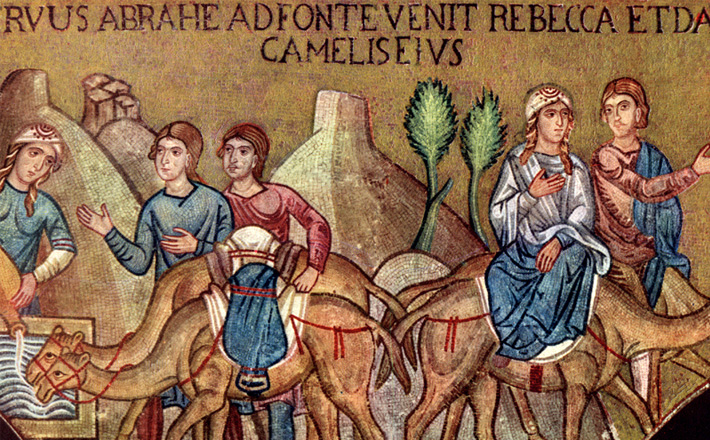Commentary on Zechariah 9:9-12
This text is familiar to us from its use in the gospel accounts of Jesus’ entry into Jerusalem; however, it presents a number of puzzles for the preacher to solve.
First, one might wonder why we are being taken back to Palm Sunday after Pentecost, during ordinary time, when the lectionary focuses on the life of the church with such themes as discipleship, vocation, and mission.
Not only is the text out of season, its apparent militarism would not, on first glance, sit well with these themes of Christian discipleship. The militarism is readily explained in light of Zion theology, which maintained that God’s presence kept Jerusalem and its king safe from enemies (Psalms 2, 46, 47, 48); even so, it remains difficult to see how to relate this theme to Christian discipleship and mission.
More puzzling still is the characterization of the rescued prisoners of 9:11 as “prisoners of hope” in the parallel line in 9:12. This unusual expression suggests that Zion’s inhabitants endure a spiritual and psychological form of captivity, not a literal one. Therein lies the problem: how can hope be a prison? Hope is a good thing, isn’t it? Yet this phrase provides an important key to solving the puzzle of Zechariah 9:9-12.
The hope holding Zion’s inhabitants captive is precisely the ancient militarist hopes of Zion theology. A closer look at how the text reconfigures this militarist tradition will show that it presents a new way to know God’s saving presence and therefore establishes a new basis for hope. The text thus turns out to be perfectly suited for reflection on life in ordinary time, as it encourages us to live out our resurrection faith by breaking free from our prisons of old expectations.
While it’s certainly possible that the reference to hope in Zech 9:12 builds on other prophetic promises of hope (Hosea 2:15; Isaiah 8:17; Jeremiah 31:17)1, it remains difficult to explain why Zion’s inhabitants would be considered its prisoners. The solution to this puzzle is that hope is not always necessarily a good thing. The term tiqveh is rare in the prophetic tradition; it is used far more frequently in the wisdom literature, where it is often associated with false expectations or humanly conceived prospects not rooted in trust in God (Proverbs 10:28; 11:7, 23).
In fact, the word is often used with the verb “to dry up” in a richly alliterative phrase that gets lost in translation (Psalm 9:18; Ezekiel 19:5; 37:11; Job 8:13; Proverbs 10:28; 11:23). We catch a glimpse of this desiccated hope in Ezekiel 37. When the exiles complain, “our hope is dried up, we are clean cut off” (Ezekiel 37:11), Ezekiel visualizes them as so many dry bones. These once hopeful people are so far gone it is absurd to ask if they can live again.
One may suggest that Zechariah 9–11 was written to address false hopes, or at least to recast outmoded ones. The superscription of Zechariah 9–11 identifies it as a massa’ (English “An Oracle”), a scribal re-interpretation of older prophetic revelation to provide new revelation for a new situation.2
While it remains an open question when this reinterpretation took place, it would have occurred either in the Persian or Hellenistic periods, well after the kingdom of Judah had ceased functioning as an autonomous, sovereign kingdom. One challenge these scribes would have faced was the lingering militarism of the older prophetic tradition. Much of Zechariah 9–11 consists of allusions older prophecies filled with mythic scenarios of the Divine Warrior coming to vanquish Israel’s enemies.
With its allusion to Zephaniah 3:14 and Zechariah 2:10, Zechariah 9:9-12 is a case in point, since both of these older prophetic texts command Zion to rejoice over God’s dealings with the enemies. For Jews living under Persian or Hellenistic control, any continued expectation that God would rescue them militarily could indeed become a prison. Locked in past ways of seeing the world and God’s ways in it, they would be incapable of seeing divine activity in their current circumstances.
How to release these prisoners of hope from old expectations? In effect, the scribes employ the older traditions to open new paths to peace. As in Zephaniah 3:14 and Zechariah 2:10, the audience is commanded to rejoice because of what God has done for Zion and its inhabitants. But where the older texts speak of enemies, Zechariah speaks of conditions that make for peace. The king is not the agent of deliverance but one who has himself been humbled yet declared righteous (contrast NRSV “triumphant”) and therefore delivered or saved (contrast NRSV “victorious”).
The fact that he is delivered but not the deliverer may explain his entry into Zion on a donkey. Donkeys do appear once elsewhere as the preferred mode of royal transport (Genesis 49:11), but it’s also the case that donkeys don’t go to war, horses do. In addition, verse 10 indicates that God (read “I” instead of “he”) banishes weapons and implements of war — including warhorses — from Ephraim and Judah. While one may infer that the banished weapons belong to the enemies, the verse does not make that claim. God’s presence secures the king and the kingdom, though not by any visibly military means. The scribes have thus subtly recast motifs associated with military victory to emphasize new ways of being at peace in the world.
By reshaping the older military traditions, the scribes have also subtly redefined the basis for hope. One is reminded of the enigmatic statement to Zerubabel in Zechariah 4:6: “Not by might, nor by power, but by my Spirit.” Hope remains grounded in the conviction of God’s presence; but once the people are released from the prison of old expectations, they are free to discover God at work in new and unexpected ways.
Notes:
1 Marvin Sweeney, The Twelve Prophets (Berit Olam, 2 vols.; Collegeville, Minn.: Liturgical Press, 2000), 665.
2 Michael H. Floyd, Minor Prophets, part 2 (FOTL 22; Grand Rapids, Mich.: Eerdmans, 2000), 444-452.


July 6, 2014